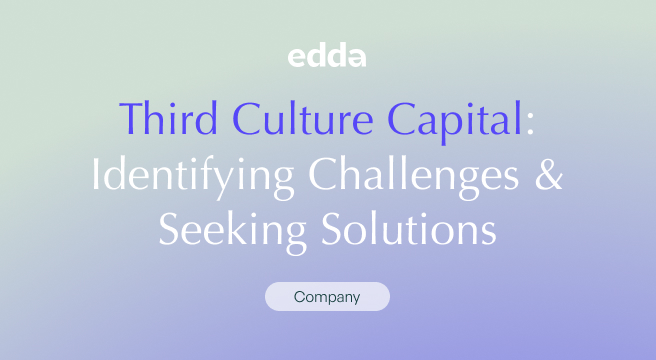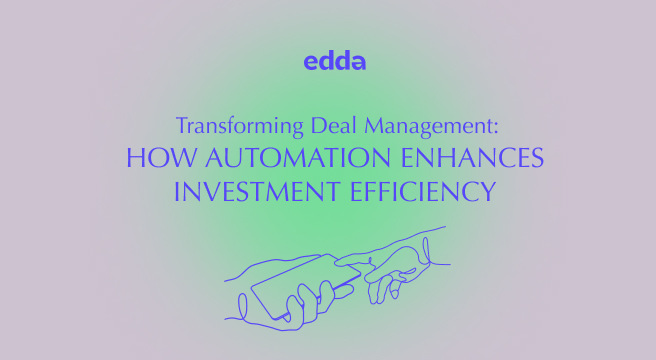U.S. venture capital (VC) fund returns have shown intriguing dynamics in recent years that have drawn the attention of investors and analysts alike. As of 2024, although still in negative territory, these returns are witnessing a promising uptick, suggesting a potential shift towards more favorable conditions.
This article aims to dissect these trends, offering a detailed examination of the factors influencing VC fund performance, the challenges currently faced by the market, and the strategic moves that investors can undertake. By understanding these elements, VCs and other stakeholders can gain a better grasp on the investment environment and optimize their decision-making processes to align with emerging opportunities.
In addition, discover how Edda’s venture capital CRM software can help your firm capitalize on emerging opportunities.
Current Trends in VC Fund Returns
In 2024, U.S. venture capital funds are exhibiting a noticeable shift in their performance metrics. After a period of downturn, marked by significant portfolio markdowns and declining returns, there’s an emerging positive trend indicating a potential revival.
The one-year rolling internal rate of return (IRR), which is a pooled metric tracking aggregated unrealized returns data of U.S. VC funds, reflects this change. Historically, the IRR dipped to its lowest at -17.9% in Q4 2022 but has since improved to -9.1% by Q2 2023, according to the latest PitchBook-NVCA Venture Monitor. This data is significant as it shows the first signs of recovery after a sustained period of negative returns, marking a potential turning point in the venture capital investment climate.
This uptick is particularly noteworthy considering the backdrop of previous years where tech valuations suffered, impacting late-stage and growth-stage venture firms severely. The recovery in IRR suggests that despite the previous challenges, there may be sunnier skies ahead for venture capital funds, potentially driven by improved market conditions or recalibrations in portfolio strategies.
Factors Influencing Recent Trends
The recent positive shift in U.S. VC fund returns can be attributed to several key factors, notably the rebound in tech valuations and the broader public market performance.
In 2023, the tech-heavy Nasdaq composite experienced a remarkable recovery, surging 43% throughout the year and an additional 9% in the first quarter of 2024. This resurgence was significantly driven by a handful of mega-cap tech stocks, including industry giants like Microsoft, Alphabet, and Nvidia, which benefited from renewed investor enthusiasm around advancements in artificial intelligence (AI).
The direct correlation between public market trends and venture capital valuations is crucial, as VCs typically adjust their portfolio company valuations based on the revenue multiples of comparable public companies.
The uplift in tech stocks has therefore had a favorable ripple effect on VC fund performance, allowing venture capital firms to mark up their investments. Kaidi Gao, a PitchBook venture capital analyst, emphasized that while the rebound isn’t uniform across all sectors, the substantial gains in specific tech segments, especially those related to AI, have been key in driving this positive trend.
The potential for interest rate cuts has also been factored into market dynamics, further boosting investor confidence and capital market activities. This environment creates a more favorable backdrop for venture capital firms aiming to capitalize on the upswing and potentially enhance their return metrics in the upcoming 2024 fundraising cycle.
Challenges in VC Fundraising
While there are signs of recovery in the U.S. venture capital fund returns, the fundraising environment continues to face challenges. One of the most striking issues is the extended duration required to close a U.S. VC fund, which has now reached a decade high of 18 months on average. This prolonged fundraising cycle is a symptom of deeper market apprehensions and investor caution, reflecting broader economic uncertainties and the aftereffects of previous market downturns.
Additionally, venture capitalists are grappling with the challenge of net negative cash flows to limited partners (LPs). From 2022 through the first half of 2023, cash distributions to LPs have significantly lagged behind their contributions, resulting in a net cash flow of -$54.8 billion. This situation creates a strain on LPs’ liquidity and can affect their overall investment strategy and commitment levels to new VC funds.
These fundraising challenges are crucial for VCs to address as they directly impact the ability to secure new capital and sustain operations. Effective strategies to overcome these hurdles include enhancing transparency with LPs, demonstrating clear paths to liquidity, and potentially adjusting fund terms to better align with current market conditions.
Success stories like the IPOs of VC-backed companies such as Reddit and Astera Labs offer hope and can serve as compelling cases to attract investor interest and improve cash returns in future cycles.
Opportunities for Investors
Despite the challenges, there remain substantial opportunities for investors, especially in sectors showing resilience and innovation.
The resurgence in tech valuations, particularly driven by advancements in artificial intelligence, presents a fertile ground for investment. Venture capitalists can leverage the growing interest in AI technologies to explore new startup ventures that are at the forefront of this trend. Such investments not only hold the promise of high returns but also position the funds at the cutting edge of technological progress.
The recent success stories from IPOs, like those of Reddit and Astera Labs, demonstrate the potential for substantial cash returns from well-timed exits. These events not only boost investor confidence but also demonstrate the viability of investing in startups poised for public market entry. Venture capitalists should focus on identifying companies with similar trajectories or those that are leaders in high-growth sectors, as these firms are more likely to provide lucrative exit opportunities.
In addition to focusing on high-growth areas, investors should consider diversifying their portfolios to include a mix of early and late-stage investments. This strategy mitigates risks but also allows for a balanced approach to capital growth and liquidity. By staying informed and agile, investors can navigate the current market complexities and capitalize on emerging opportunities to drive substantial growth and achieve competitive returns.
Enhancing VC Strategies with Edda’s VC CRM
As the venture capital sector begins to recover, especially within tech and AI, the strategic use of Edda’s CRM venture capital platform becomes key. Edda’s venture capital CRM software enhances fund management through advanced analytics and real-time data, helping venture capitalists make informed decisions swiftly. By adopting Edda’s investment portfolio management software, VC firms can optimize investment strategies, improve relations with investors, and better navigate the competitive market landscape.
Explore how Edda’s CRM can transform your venture capital management by contacting us for more details.



